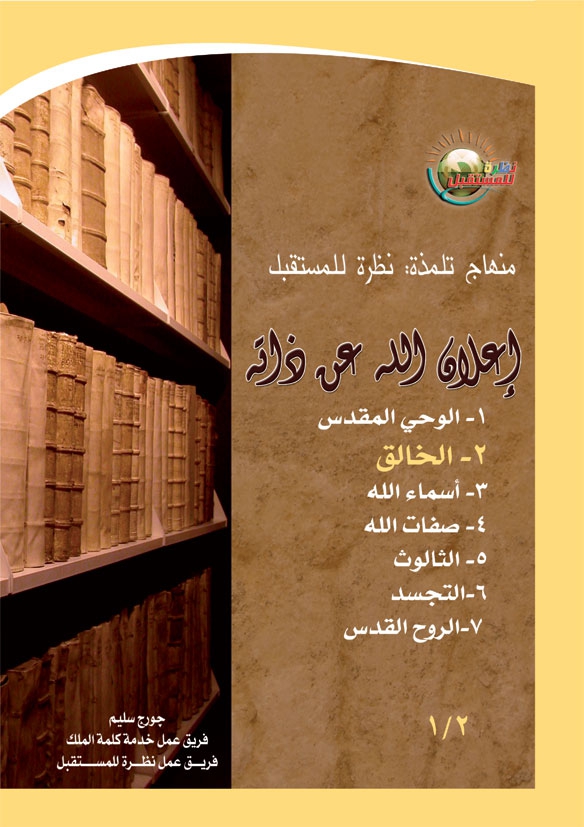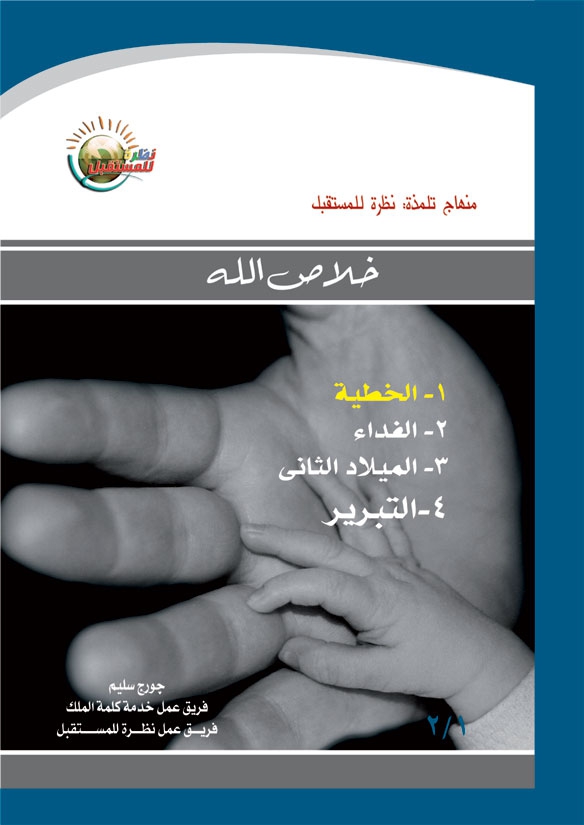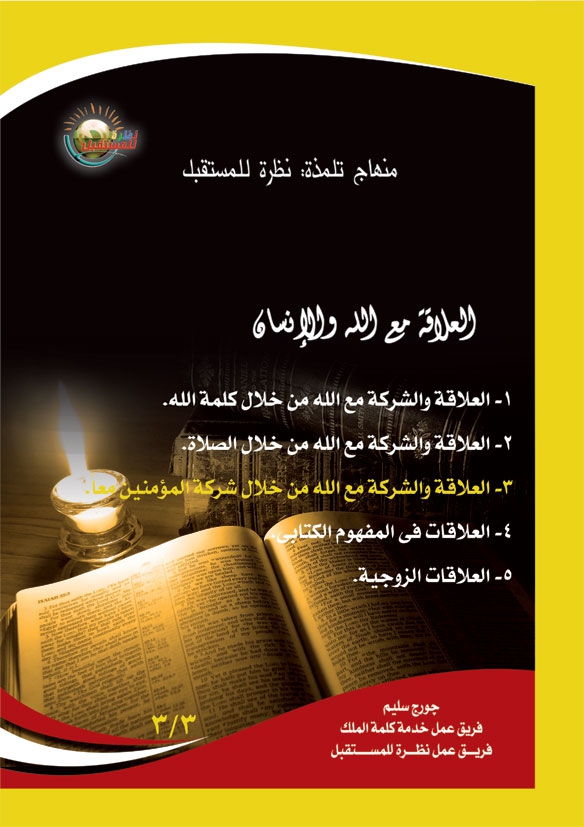Discipleship Curricula
Making disciples is the system followed by Christ from the beginning of his ministry with the twelve disciples, and again, later, with the seventy apostles. The practice of discipleship is not one of the various ways that we can choose to use, it is the only way, and the solution for preparing every new generation of believers for ministry and leadership, to influence the lives of others—because Jesus Christ himself used discipleship. This curriculum aims to help new believers grow in their spiritual life.
God’s Revelation of Himself
Author: Mr. George Selim
Publisher: Vision For Future
Holy Inspiration
A servant of the Lord asked a little girl if she knew what the Bible was about. She proudly responded and said, "Certainly, I know that sir. I can find the picture of my father's friend and the car insurance." She was honest in her answer. Many people do not understand God's basic purpose for this precious book that provides support and comfort to the suffering, and to needy human souls.
The Bible is the only unique book in which we find the written declaration of God's will for man. It is the only book that offers redemption for man and gives a solution to all of his problems.
In the same way as countries grow and prosper, thanks to their constitutions (provided that they apply them completely), so also our spiritual life grows and thrives, thanks to our Constitution, the Bible (if we apply it). Just as the Constitution is the supreme law in a given country, so the Bible is the supreme law of God in our lives as well. God declares his spiritual laws in the Bible. In addition, the Bible presents his generous and sincere promises to us.
The strength of our spiritual life depends on the time and status that we are giving to the Bible in our lives and in our thoughts. The knowledge that comes from the Bible gives meaning, beauty, and richness to life. The Bible fills the vacuum of our souls and it fills the gaps in our lives. It turns the dark and barren days into bright and fruitful ones
The Creator
“For this is what the Lord says, he who created the heavens, he is God; he who fashioned and made the earth, he founded it; he did not create it to be empty, but formed it to be inhabited, he says: “I am the Lord, and there is no other.”
(Isaiah 45:18)
All natural phenomena and laws emphasize that there is a Supreme Being in control of the universe.
(Einstein)
God created everything in heaven, from the sun, to the moon and the stars, and on earth, from plants to animals to birds, and then he created man, the crown of creation. He created everything for a particular purpose and goal. He created the universe and the world, from nothing. We believe that there is a great creator who already planned the universe. He, God, the One and the only, created this universe and all creation.
The Creator used his ability, his wisdom, and his understanding to create the universe. God did not leave this creation for even a single moment after he had finished it. He carefully followed up on his creation with his close observation. He periodically visited the land. He devoted attention to the salvation of man. We see God’s power in the creation. He uttered the word first, and then he gradually worked. He gave everything its importance. He controlled his creation with laws. He holds the reins of these laws.
Some people question the existence of the Creator because of their love of sin. They claim that there is ambiguity in creation because of their pride. They justify this by the existence of pain and disaster. However, these disasters took place in the world when sin entered human life and the world. All the sufferings that took place on the earth are the harvest or result of sin. However, God loves man because He created him in his own image and likeness. God sent Jesus Christ as the Savior, redeemer, and mediator, to save man. He helped and strengthened man after He had saved him from his eternal death.
The Names of God
“Why do you ask my name? It is beyond understanding.”
(Judges 13:18)
God revealed Himself in every visible and spiritual way. He came in flesh to our land. He fulfilled his promise of redemption through Jesus Christ. Our Creator was not obscure or unknown. He was the true and known God. Our Creator has many names, not just one. These names reveal his true majesty and divine nature. All of these names are living and active ones. They do not contradict each other. No name carries the meaning of hatred, or envy, or revenge, or pride, or violence. The Names of God can be divided into two categories: (1) names of God that reveal God’s self and nature, and (2) names of the Covenant, which reflect God’s ways, abilities and dealings. Some names of God are Elohim, El Elyon, El Olam, El Shaddai, Adonai, Father, and Yahweh. Some names of Covenant are Yahweh Yireh, Yahweh Rapha, Yahweh Nissi, Yahweh Shalom, Yahweh Ro’i, Yahweh Tsidkenu, Yahweh Sabbaoth, and Yahweh Shammah.
We should strive to truly know God, so that we can clearly put our confidence in the Lord. The Bible says, “Those who know your name trust in you.” (Psalm 9:10). He fills us with energies of divine love and security. The Bible teaches us, “He refreshes my soul. He guides me along the right paths for his name’s sake” (Psalm 23:3).
The Attributes of God
“Among the gods there is none like you, Lord; no deeds can compare with yours.”
(Psalm 86:8)
There is no god like our Lord, the great and unique Creator. The Bible describes God as a spirit, eternal, one, alive, unlimited and self-existent. His attributes are complete. These qualities will help us greatly in thinking and dealing properly with God because they are genuine. He did not gain them from any direction or other being. They’re his eternal and unchanging attributes. They are absolute and complete attributes because God himself is unlimited, so His attributes do not lack anything. Nothing can increase His glory. They are compatible and do not contradict or conflict with each other. Their working is not disturbed. These attributes include holiness, righteousness, truth, love, justice, ability, compassion, honesty, kindness, power, wisdom, and patience.
God is holy. The Bible says, “Who will not fear you, Lord, and bring glory to your name? For you alone are holy. All nations will come and worship before you, for your righteous acts have been revealed” (Revelation 15:4). Holy means full infinite purity. God is completely separated from any evil, desecration, or corruption. The Bible says, “Your eyes are too pure to look on evil” (Habakkuk 1:13).
God does not know hatred or envy, but his unlimited entity shines with love because he is the greatest God, who loves and teaches us to love. God is love. One sign that proves the love of God is that he created man in his own image. God also finds delight in man. The Bible observes God “rejoicing in his whole world and delighting in mankind” (Proverbs 8:31). God gave man authority to rule over the fish of the sea, over the birds of the sky, over the cattle, and over all the earth. He intervened to save him when man fell. God's love is distinguished because it is without reason and for nothing good in us. God does not love us for our piety, works, or abilities, but He loves the sinners and the weak. This attribute is reflected in the character of Christ, who strongly approached the marginalized, the lost, the ignorant, the helpless and the sinners. He dealt with them in his love. He attracted them to a life of righteousness. He forgives their sins without reason. This is God’s true love, which appeared openly to us and covered all of humanity.
The Trinity
The most beautiful thing in life is to think and meditate on, "the God of life Himself." It is agreed that "God's 'self'" is different from all other 'selves' (such as those of man, animal, inanimate objects... etc.). The only and basic way to have any knowledge about such a God is to humbly listen to what He reveals of himself. Who is more competent and efficient to teach us about God than He himself?
Man has imagined and created gods from his own thoughts and desires, leading to endless forms of declared and hidden idolatry. Man started to worship those gods, taking him far from the true God. Man put himself where he could not know God, who is the most important thing in this life.
In order to have a correct perception of God, and a correct relationship with him two important things are required of us:
1. We need to consult the Bible to see clearly what God has revealed to us about Himself.
2. We should not take our knowledge and thoughts about God from other people, because it will cause confusion. There is great difference between the Creator and the creature. The nature of God cannot be equal to the nature of other creatures. We cannot interact with deity in the same way as we interact with other creatures, because deity cannot be compared to material things.
The apostle Paul said, to the people of Athens, "Being then the children of God, we ought not to think that the Divine Nature is like gold or silver or stone, an image formed by the art and thought of man," (Acts 17:29).
God is an everlasting and eternal spirit. He is immaterial, invisible, unlimited, immeasurable and unmatched. His perfect attributes do not change. God alone is able to reveal himself. We must ask this question: What does God say about himself?
The Incarnation
“Beyond all question, the mystery from which true godliness springs is great: He appeared in the flesh.”
(1 Timothy 3:16)
No child has been born throughout human history without a physical relationship between a man and a woman. The greatest and the most unique sign happened when Jesus Christ was born of a virgin who was not touched by a man. The Bible says, “Therefore the Lord himself will give you a sign: The virgin will conceive and give birth to a son, and will call him Immanuel” (Isaiah 7:14). The birth of Christ took place during a specific time through the Holy Spirit when he was conceived in Mary. This is the only birth that happened in the history of mankind in this way.
Christ was the Word of God that became flesh. The Bible says, “The Word became flesh and made his dwelling among us” (John 1:14). The Bible reveals and explains Christ’s eternity and divinity. It says, “In the beginning was the Word, and the Word was with God, and the Word was God” (John 1:1). This revelation also highlights His ability and work, saying, “Through him all things were made; without him nothing was made that has been made. In him was life, and that life was the light of all mankind” (John 1:3, 4). We benefit by attending to the great mystery that happened when the second Divine Person became flesh. One mystery is that the incarnation fulfills the role of mediation. Christ was the mediator of the new covenant between God and all peoples of the earth, in all generations. God revealed his nature, glory, commandments, thought, and will, so that we can live a better life. The Apostle Paul says, “For there is one God and one mediator between God and mankind, the man Christ Jesus” (1 Timothy 2:5). The divine and human natures were united in Jesus Christ, who became flesh. Jesus Christ became the only mediator between God and men by his incarnation.
God revealed his deep and genuine love to people in the incarnation without any reason in them or from them. The only reason was that “God is love” (1 John 4:8). This is the whole essence of Christianity. The incarnation reflected the certainty of companionship. God meant to tell us that the incarnation of his only begotten son is a new beginning for us to know and experience that God is with us.
There are many proofs regarding the divinity of Christ, such as the conditions and events of his birth, his great moral and spiritual life, his power over everything, his complete knowledge, his ability to change hearts, his acceptance of worship, and his resurrection. All of these things prove that Jesus Christ is the holy God who became flesh and who loved us and did all this for our sake.
The Holy Spirit
“But you will receive power when the Holy Spirit comes on you; and you will be my witnesses in Jerusalem, and in all Judea and Samaria, and to the ends of the earth.”
(Acts 1:8)
The Holy Spirit is one of the three Persons. The three Persons are one in essence. The Holy Spirit personifies holiness and purity. Because of His presence in our lives we are able to distinguish the manifestations of evil and that their source is Satan. He also gives us the strength to be in complete separation from these sins. The names of the Holy Spirit are the spirit of God, the eternal Spirit, the comforter, the spirit of grace, the spirit of holiness, the Spirit of truth, the spirit of life, the spirit of wisdom and understanding, the holy spirit of the promise, and the spirit of glory.
God’s Word describes the attributes and works of God the Holy Spirit. He is eternal, omniscient, and omnipresent. He has power over everything. Great works, such as creation, providing scripture, completion of Second Birth, renewal and change, and resurrection are also attributed to the Holy Spirit. He has many symbols in the Bible, such as water, wind, fire, wine, oil, dove and renewed strength.
The Holy Spirit appears in the lives of the children of God. He dwells in them, gives them strength, testifies that they are children of God, supports them in prayer, sanctifies their lives and behavior, teaches and guides them, leads them in life and ministry, and gives them divine fruits. The Holy Spirit works in the Church. He also fulfills holy unity among his people. He leads us in worship and gives spiritual gifts.




